Thomas E. Ricks's Blog, page 238
July 25, 2011
North Africa and trans-Atlantic defense: The American phase lasted from Suez in 1956 to Libya in 2011
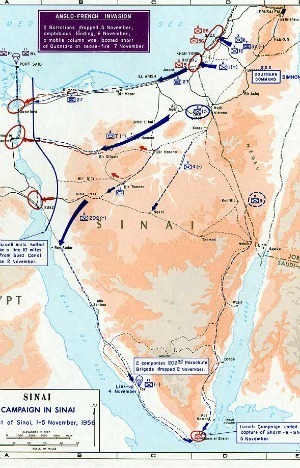
By Patrick McKinney
Best Defense department of Maghreb affairs
In late October 1956, British and French forces aided
Israel's seizure of the Suez Canal from Egypt. In March 2011, an allied force including British and French forces
intervened in Libya to establish a no-fly zone and protect rebels from the
ruling Gaddafi regime. Half a century
apart, these actions in North African defined trans-Atlantic defense. The Suez Crisis heralded an era of American
leadership and action, while Libya has shown that, though powerful, America
intends to rely on its allies to carry larger burdens, and take responsibility
for their own regions. America once
drove and financed western security, but due to fiscal shortfalls and a decade
of conflict, it no longer intends to guarantee European security.
In 1956, the once-powerful European states were still
weakened from the world war and faced forceful colonial independence
movements. The French lost Indochina in
1954 and the situation in Algeria continued to deteriorate, while the Suez
Canal Zone in Egypt was England's last foothold in the Middle East. After tense negotiations, Egyptian President
Gamal Abdel Nasser threatened to nationalize the canal as sovereign Egyptian
territory, and in response, Israel, England, and France coordinated an invasion
with the pretext of securing the canal for world commerce. They failed to inform the United States of
their intent and expected American support or indifference. To their surprise, they received neither.
President Dwight D. Eisenhower forcefully protested the Suez
invasion and demanded that foreign forces withdraw from Egypt. Though he had little compassion for Nasser
and his regime, Eisenhower intended to support international order and avoid
unnecessary international conflicts. He
condemned the invasion, saying, "We believe these actions to have been taken in error. For we do not accept the use of force as a wise and proper instrument for the settlement of international disputes." Israel, England, and
France were surprised by the American response and false expectations of
support. Their forces began withdrawal
from the Suez Canal Zone, and returned control to Egypt.
After the conflict, American authority and consent became
pre-eminent in the Trans-Atlantic partnership.
Through NATO, America assured European defense from the Soviet Union and
Warsaw Pact, and American priorities were NATO's priorities. England lost its Middle Eastern influence
and decided to influence western and world security through cooperation in its
"special relationship" with the United States. Embarrassed and affronted by the perceived betrayal, France took the
alternate path and sought to set its own defense priorities. France demanded a restructure of NATO
leadership in 1958, and began the withdrawal of its forces from the command in
the 1960s. France remained outside of
NATO for more than forty years until operations in Afghanistan and officially
returned its forces in 2009.
[[BREAK]]
President Barack Obama approved American involvement and
leadership of the initial attacks on Libya during Operation Odyssey Dawn, but
stressed NATO's lead in maintaining the continued no-fly zone. Operation Unified Protector continues under
NATO leadership, with NATO aircraft conducting airstrikes against regime
targets, but American support aircraft still provide the majority of
intelligence, transport, and communications capability, and American attack
aircraft continue to conduct limited strikes. England has deployed ground attack helicopters and both France and
England have deployed limited ground advisors to support the rebels, but
support across NATO is waning. Member
states have announced they will end their support missions, and NATO countries
have run low of precision ammunition and other enablers. Despite a public portrayal to the contrary,
America is still leading the action in Libya, even as its government continues
to lose public support and struggles to justify the increasing costs.
After decades of American presence and power, the European
NATO militaries find themselves unprepared, ill-equipped, and under-resourced
to execute substantial military operations, even in the Mediterranean Sea,
Europe's own southern boundary. Europe
has withdrawn from Iraq and its governments are planning drawdowns in
Afghanistan as the strains of deployments have revealed reduced military
preparedness. After decades of an
American security umbrella, Europe may have to fight for itself, and Europe is
not ready.
On June 10, 2011, American Secretary of Defense Robert Gates
praised NATO support and operations in Afghanistan and Libya, but warned of the
decreased European defense commitment. He spoke of NATO becoming a "two-tier alliance" and urged member states
to re-evaluate their funding and manning commitments. After a decade of the Long War, and two
decades since the end of the Cold War, America can no longer afford, and
appears unwilling, to guarantee European security. Gates said:
The blunt reality is that there will be dwindling
appetite and patience in the U.S. Congress, and in the American body politic
writ large, to expend increasingly precious funds on behalf of nations that are
apparently unwilling to devote the necessary resources or make the necessary
changes to be serious and capable partners in their own defense. Nations apparently willing and eager for
American taxpayers to assume the growing security burden left by reductions in
European defense budgets.
He reiterated American support for NATO and Europe and
stated that the alliance has overcome six decades of conflict and
disagreements, but also stressed that NATO members must make serious commitments to
their own defense.
The Suez Crisis confirmed American leadership in Western
defense and defined the security roles of Europe for generations. The Libyan intervention has defined a new
defense reality. After a decade of war
in Iraq and Afghanistan, economic recession, substantial national debt, and
domestic political stalemate, America appears unable and uninterested in
ensuring European defense. With the rise
of regional powers such as China and India, the United States will rebalance
its presence in Asia, and continue its reductions in Europe. A new security era is upon us, and an intervention
in North Africa has once again defined the rules.
Patrick McKinney served as a United States Army officer
and deployed to Operation Iraqi Freedom IV.
He now resides in Alexandria, Virginia. The opinions and views expressed
in this piece are his own
.
Wikimedia Commons
July 22, 2011
The Best Defense 'worst president' of the 20th century contest: The readers' choices are Reagan and Wilson

I was surprised to
see Ronald Wilson Reagan and Woodrow Wilson almost tie as the worst presidents
of the 20th century. Reagan led most of the week, but Wilson pulled by him
yesterday afternoon -- only to be edged out in the final tally when I shut down
voting at 9 A.M. eastern time this morning.
I understand Wilson's
showing -- both the pacifist left and the non-interventionist right loathe him,
as well as many people who simply see him as a racist. But I suspect Reagan's
high score says a lot about the readers of this blog. Based on comments posted
on this blog and notes to my blog e-mailbox, you guys really think Reagan was a
bad president. I suspect his surprise near-"win" is due in part to a growing
distaste with tax-cutting ideologues who seem blithely unaware of the damage
they do. Sample comment from Boone, N.C.: "with his half-baked political
philosophy, Reagan set this country on its present course to ruin."
The surprise to me
is how even the voting was. After Reagan and Wilson, it basically is close to a
scatter-shot tie between the rest -- Harding, Lyndon Johnson and Nixon clumped
together, followed by Carter and Hoover, who also tied. And old Coolidge
brought up the rear with one vote.
I was impressed that
one Marine intelligence analyst in Afghanistan took the time to send in an
anti-Harding vote. Another military e-mail voted against Richard Nixon, not for
the usual reasons of corruption and such, but because, he wrote, "He's
helped the Chinese more than he's helped Americans. We're still paying for his
foreign policy coup since most of our manufacturing is now over there."
And you all
certainly don't agree with me about JFK.
In fact, there was not a single whole vote for him as worst president of the
century, although one person gave him a half vote, and several offered him 2nd place,
maybe just to be nice to me. Reading over the discussion and notes, I've been
persuaded that he was not the worst president of the 20th century, but probably
the most over-rated. (Though of course many of you would give that title to
Reagan.)
I'm also surprised
that Lyndon Johnson didn't get more votes. And apparently people have forgiven
Bill Clinton his inability keep all his body parts inside his clothing -- not a
single person named him, despite the apparent bias against Southern Democrats
(Wilson, Carter, Johnson) in the polling. And yes, Wilson was a Southern
Democrat. He received one of the most succinct votes: "On any
consequentialist reading, whether you are realist or liberal in international
relations, the worst American president in the international realm of all time.
On civil rights, more retrograde than any American politician since Andrew
Johnson."
Here is the final
tally:
1. Ronald Reagan
17.5
2. Woodrow Wilson 17
3. Warren Harding 9
4. Richard Nixon 9
5. Lyndon Johnson 8
6. Herbert Hoover 7
7. Jimmy Carter 7
8. Calvin Coolidge 1
9. JFK .5
Comment of the day: Gourley on two more good outfits helping veterans

This comment was posted by Jim
yesterday in response to the item
recommending three charities helping veterans of combat.
His last paragraph should be
etched in stone somewhere.
By Jim Gourley
Best
Defense commenter of the year
I work with Team Red, White and Blue, which
whose founder and CEO, Mike Erwin, is an active duty Major in the Army. The
concept is one you've heard before, but important to the veterans' fight -- keep
your money, we want change.
The concept is to be a Big Brothers/Big
Sisters for veterans. It's pretty simple -- folks like Wounded Warrior and IAVA
have plenty of money and machismo to throw at Congress. That base is covered.
It's also arguable that Congress is so far out in left field that there's a
point in covering it. Let's face it, money is drying up and veteran care will
take a hit. However, the organization believes that the government can only do
so much. It's the people that it represents that can do the most good. Go to
the website and sign up to be an advocate. If
we find out about a veteran in your area who's wounded, experiencing
psychological difficulties, has financial or child care issues, or just needs a
friend to help them get through a lonely day, we call you, provide you with the
necessary resources and information, and make the introduction. We provide
people who want to help veterans the chance to ACTUALLY HELP A VETERAN.
Throwing money at the problem hasn't solved
it. I've said it before. It's a human problem. It requires a human solution.
That solution is working.
The other group I'd plug is Ride2Recovery. If you say I'm crazy for
thinking that riding a bike can help you overcome the effects of PTSD, you'd be
right. That's the whole point. I never smoked pot. I never got a hit of MDMA. I
got on a bike and kept pedaling. I haven't stopped. I have no scientific data
on this. All I know is that it worked for me, and I've met countless veterans
who have done the same thing. It is an incredible thing for these people to do
something so difficult that they never thought they'd get through it. It
re-empowers them. It gives them a fight to get back into, and the support they
need to win it. When you lose a limb, your mind, your career and your future,
it's a wonderful thing to put one back in the win column. Their headquarters is
in California but they have rides from coast to coast.
The people who saved my life didn't give a
dime. They gave a damn. They worked with me, lived with me, left me alone when
I needed to be alone and stayed with me when I needed someone there. I'm here
because of them. Others out there aren't lucky enough to have friends like I
did. Congress can't be there for them, but people in their neighborhood can.
Rebecca's War Dog of the Week: Russia trains 'remote-controlled' dogs
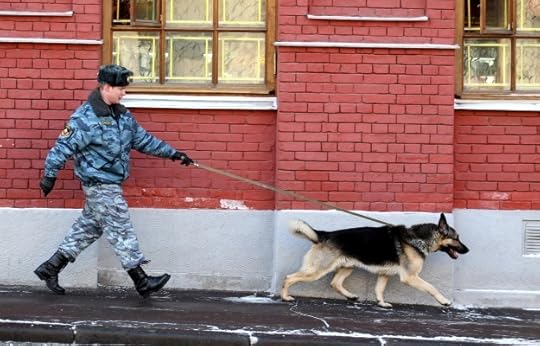
By Rebecca Frankel
Best Defense Chief Canine Correspondent
It seems that Prime Minister Vladmir Putin isn't the only one using dogs to get the upper hand in Russia. And the United States isn't the only country catching on to the how valuable bomb-sniffing dogs are in the field. After the bombing at Moscow's Domodedovo airport last January, President Dmitry Medvedev has made a big push to get more sniffer dogs on patrol -- and more dogs there will be.
The Russian military is banking on what they're calling "high-tech" bomb-sniffing dogs -- an overstatement perhaps given its rudimentary function. As the BBC reports from a military base outside of Moscow, this elevated technology is really just a remote-controlled dog, consisting of little more than a walkie-talkie and small video camera strapped to the dog's collar.[[BREAK]]
The way it works is the soldier calls commands to the dog through the walkie-talkie navigating the dog to the location of the suspected explosives. If the dog alerts -- gives the signal that a bomb is at the scene -- the handler commands the dog back again, and the bomb is safely detonated. When the dog needs to go into a location at a greater distance or into a building where the handler cannot follow, he watches "a video screen strapped to his wrist" from a safe distance.
The Russian army believes that remote-controlled sniffer dogs will help keep the army and the public safe.
"Dogs can detect the kind of deadly material and explosives that a human being, a robot or a mine detector often struggle to find," says Colonel Vasily Kondratyuk, head of the 66th Military Engineers Corp, where the army's sniffer dog centre is based. "With their help we can prevent terrorist attacks. Dogs really are man's best friend. Because they save lives."
The standout among the Russian canine ranks is Heinz, a big black Lab with a happy face.
"He's the most intelligent dog we have here," says Private Sasha, his handler. "He's kind, obedient and very clever."
Dare to be a CNAS Next Gen member

CNAS
has a cool program for people in the "Next Generation" of national security
leaders. It now is accepting applications
for the next class. If you can get into this, you should. You don't have to
live in the 24th century,
nor even be a Trekkie. But having pointy ears might help. Or at least a
fondness for Anchor steam beer.
July 21, 2011
Looking for a few good charities for vets that could use your support?

A reader of this blog, himself a vet, wrote to ask for
recommendations for charities that help combat vets with PTSD, TBI and related
problems. I in turn asked my CNAS colleague Nancy Berglass, who is an expert in
the subject. Here is her response:
Here
are a few I have vetted myself:
The Pathway Home Yountville, CA (thepathwayhome.org)
(located
on the grounds of the CA Veterans Home)
--Offers
intensive, evidence-based residential support in a therapeutic community
setting to veterans who need extra support before they can reintegrate
successfully with family and/or community. Emphasizes creating an
environment that is: Safe, Respectful,
Caring, Challenging, Supportive.
Project Victory at TIRR Foundation,
Houston, TX (projectvictory.org)
--
Top-notch rehab for traumatic brain injuries and post-concussive syndrome at no
cost to the patient. Serves veterans of Operations New Dawn, Iraqi
Freedom, and Enduring freedom.
USA Cares, Radcliffe, KY (http://usacares.org/)
--
Provides post-9/11 military families with financial and advocacy support in
their time of need, including grants that pay for community-based counseling
and mental health services for servicemembers and veterans with PTSD.
Assistance is provided to all branches of service, all components, all ranks
while protecting the privacy and dignity of those military families and
veterans who request help.
No. 15: A Navy recruiting CO fired
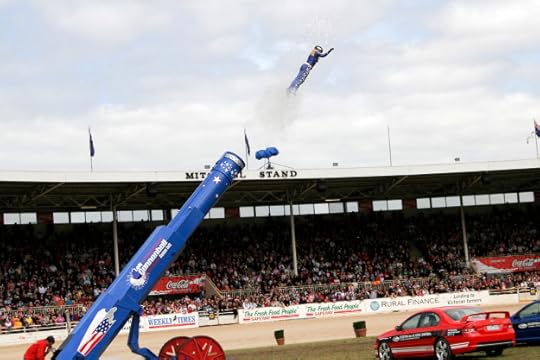
He
was based in Nashville. I asked Rubber Ducky and he says this is not a summer
housecleaning, the Navy is just dealing with self-immolations as they ignite.
The Navy has almost tied last year's
total of 17, and appears to be aiming for a modern-era record of 26, set in
2003. I do admire the sea service for continuing its tradition of
accountability, and for being public about it.
Alabama still collecting taxes to support Confederate pensioners
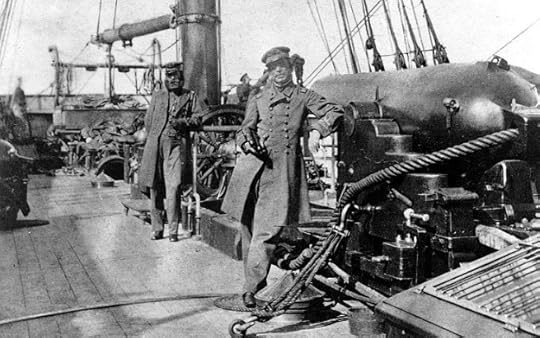
No, there are no Confederate
veterans still alive. But the state of Alabama has never done away with the
property tax instituted to support them. The money now goes to support a
Confederate memorial park. Time for some of it to go to memorialize
the victims of the
Birmingham church bombings?
A summer seminar in Cairo: More scenes from the Egyptian revolution
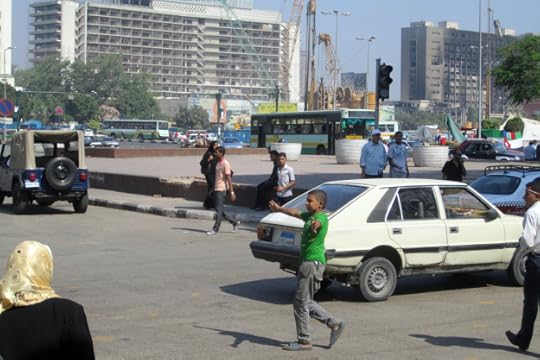
By Joseph T. Stanik
Best Defense guest correspondent
I read with keen interest
Lady
Emma Sky's posting "Letter from Cairo: A
Stroll through the Ancient
City in Search of the New
Egypt" (May 31, 2011). I followed her to Cairo by a month and like Lady Emma
acquired a priceless history lesson: an account of the 25th of January
Revolution from those who lived through it. Furthermore, through conversations
with many Cairenes, I gained unique insight into their hopes and worries for
the future. My two weeks in Egypt were very illuminating and generated the
deepest respect and admiration for a great people who stood up to a corrupt,
cruel dictator and ultimately forced him from power.
My first full day in Cairo, an American friend who is a graduate student at
American University in Cairo and lives just two blocks from Tahrir Square gave
me a thorough tour of the area of the conflict downtown. I observed several
notable landmarks including the burned-out headquarters of Mubarak's National
Democratic Party, which still bore a undamaged billboard touting the NDP as the
best guarantor of the future for Egypt's children; the Sadat Metro Station at
Tahrir Square, where protestors removed grates near the entrances and dug
foxholes under the sidewalk; and the scorched but functioning interior
ministry, where I didn't dare take any photos. My friend described in
fascinating detail how the protestors built up their defenses around Tahrir Square. Very
early in the rebellion, they realized that they must expand their perimeter or be
overwhelmed by the security forces. They gradually worked their way up the
streets radiating from the square, extending the area under their control and
erecting sturdy barricades with any practical material they could lay their
hands on. Several sidewalks are still missing paving stones that were used to
construct barricades. A few yards back from the outermost barricade, the
protestors built another one, then another, and then another. The successive barricades enabled them to
advance well forward to confront the security forces, Mubarak supporters, or
hired thugs, and then make a covered retreat. When the army deployed to
stabilize the situation, tanks and armored personal carriers took up positions
between layers of the barricade, enforcing the separation between the
protestors and their opponents. [[BREAK]]
When I visited Cairo in the summer of
2010, the conversation in coffee shops centered on the World Cup. This summer,
the talk is focused mainly on politics. In the months following the overthrow
of the Mubarak regime, Egypt has become politically vibrant; it seems like
every Egyptian has an opinion, and they are openly discussing and debating
crucial issues in advance of the parliamentary and presidential elections later
this year. The lady, who roams about Falaki
Square selling newspapers accompanied by her young
daughter, has probably never been busier. I spent several evenings with two
Egyptian friends in the square's coffee shops and the popular watering hole
Horreyya. One friend is a desert tour director; the other is an architect. One
evening, they buy copies of Al-Dustour (The Constitution) from the newspaper
lady, pore over the paper, and comment on several articles. For example, they
are concerned about a report that the Muslim Brotherhood has received billions
of dollars in international donations. They are worried about the level of
influence that the Brotherhood and Salafists might have in the new government. The
tour director argues for a secular government in which "Islamists will not able
to judge the actions of people." He adds that they are "trying to be more than
they are." The architect agrees and states that the best way to restrain the
Islamists is to develop strong secular parties and put the new constitution in
place before the elections. When I ask them what the constitution should
contain, they offer a few specifics, such as term limits for the president, but
are adamant that the document must do the very difficult: guarantee their
security and at the same time safeguard their rights. They're also disturbed by
Secretary of State Clinton's announcement that the Obama administration is open
to a dialogue with the Brotherhood. The newspaper lady returns, and my friends
buy copies of Al-Masry Al-Youm (The Egyptian Today). They devour the news and
both complain that the military government is not moving fast enough to carry
out the transition to true democracy and to bring Mubarak to justice for
corruption and for ordering deadly measures against the protestors. They worry
that the new government will also be infected by corruption.
I visited an antique shop
in the Zamalek neighborhood where last year I met a female reporter for Radio
Sawa. Her best friend runs the shop, and she helps out between radio spots. During
the revolution, she tirelessly filed stories even when the internet was shut
down by the Mubarak regime. When the net was down, she called Radio Sawa's
office in Washington,
using either a cell phone or land line, and reported live on the air. She
witnessed the huge "Day of Rage" demonstration (Jan. 28) and the bizarre
"Battle of the Camel" (Feb. 2) between Mubarak supporters and protestors. She
and hundreds of other protestors knew that "the gig was up for Mubarak" when he
deployed thugs on camels in a futile attempt to thwart a popular movement that
was informed and guided by Twitter, Facebook, satellite TV, and laptops.
The area around Tahrir Square was
largely peaceful during my visit, but violence did erupt on three occasions. On
June 28, a violent clash took place. For weeks, the families of
protestors, who died at the hands of the Mubarak regime during the revolution,
had demanded compensation from the military government. That night, hundreds of
protestors marched on Tahrir
Square, but their ultimate destination was the
interior ministry. The protestors were met by security police at the square and
a major battle took place. The number of protestors swelled to several
thousand, and the confrontation lasted throughout the night. Several hundred
protestors were injured. The army ordered the police out of Tahrir Square, and soldiers took up
positions around the interior ministry. Demonstration organizers declared
Friday, July 1, the "Day of Retribution and Loyalty to the Martyrs of
the Revolution." They objected to the slow pace of reform under the
military government and demanded immediate trials for the former interior
minister and security personnel responsible for the deaths of
protestors. Several thousand demonstrators converged on Tahrir Square and were joined by the
families of the martyrs, who stirred up the crowd. The rally was peaceful and
had a carnival atmosphere until after mid-afternoon prayers when a large
number of protestors marched on the cabinet building and the interior ministry
but were stopped by security forces and the army. A clash ensued, but by
morning, the square was back to normal. Traffic flowed smoothly
under the supervision of civilian "traffic cops," and several protestors
still camped in the square. On the evening of July 3, my last night in Cairo, I returned a final
time to Tahrir Square.
I got out of my taxi on the northwest side of the square and ran headlong into
a melee that had just erupted. Pro-Mubarak thugs, who had infiltrated the
square as vendors, attacked a gathering of protestors with rocks and clubs and
set fires in the square. I took refuge one block behind the square and then
walked the long way back to a friend's apartment located south of the square,
all the while giving the fracas a wide berth.
Two days before departing Egypt, I witnessed an incredible
sight: a young boy directing traffic on hectic Qasr al-Ainy Street
where it meets Tahrir Square.
(See photo.) This is the most memorable image of my visit. I've been thinking
a lot about him, his fellow Egyptians, and the extraordinary
challenges that they face in the months and years to come. Could he and
his colleagues standing out in the traffic be sending the military
government and the rest of us an important message? Perhaps
they're telling us: "We're capable of governing ourselves,
and we'll do a hell of a better job than the regimes of the past 59
years!"
Joseph T.
Stanik, a retired U.S. Navy officer, travels annually to the Middle
East. He teaches Middle Eastern history at New
Era Academy
in Baltimore and at Anne
Arundel Community
College in Arnold,
Maryland.
Best Defense's worst president poll
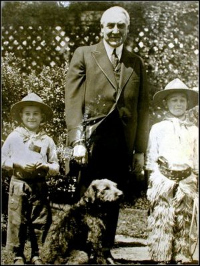
The results will be
posted tomorrow, so if you care to vote,
please do so sometime today.
And yes, Jimmy
Carter should have been on the list. I just forgot about him.
Thomas E. Ricks's Blog
- Thomas E. Ricks's profile
- 436 followers



